Islamic Banking in the European Union: A Detailed Analysis
VerifiedAdded on 2023/02/02
|8
|2706
|56
Report
AI Summary
This report provides an overview of the Islamic banking industry's emergence and growth within the European Union. It highlights the industry's key features, including its adherence to ethical and socially responsible investment practices, which have attracted both Muslim and non-Muslim clients. The report discusses the opportunities presented by globalization, particularly in trade with ASEAN and GCC countries, as well as the growth of Islamic banking in the UK, supported by governmental initiatives and the presence of numerous Islamic finance institutions. Furthermore, the report examines the role of FinTech in driving the development of Islamic banking, with examples like "Insha" in Germany and its expansion plans across Europe. The challenges faced by the industry are also addressed, with an optimistic outlook for the future of Islamic banking and finance in the EU.

Islamic Banking In European Union Countries
Islamic banking is a relative young industry, with a high rate of growth, which in the last years
became a highly discussed subject, due to the challenges and opportunities that it brings. Due to
the fact, that in the last decade, the Islamic banking made its presence in the European Union
market, too, in this paper we try to describe the main features of the Islamic banking transactions
and to identify the challenges and opportunities that its brings.
Nowadays the banking industry continues to grow amid the challenges and opportunities that are
present in Europe. There are good reasons why Islamic banking in Europe is on the rise, starting
with the strength of the financial institutions that are based in Islamic countries.
Some Opportunities are-
Sound Banking Practices and Ethical Investments:
The Islamic banks have incredibly strong economic operations. They adhere to their no-interest
policy very strictly, and this principle is never violated. Additionally, banks follow stringent
guidelines and frequently work to prevent disruptions when it comes to sharing profit and loss.
Although Islamic banks target their products mainly to Muslims, they also try to gain clients
outside Islamic community, especially among middle- and upper-class individuals. The major
appeal of Islamic banking for non-Muslim clients is the ethical and socially responsible nature of
Islamic financial investments. In a survey conducted among 100 private bankers around the
world by the Economist Intelligence Unit in 2012, the surveyed said thatthey expected the annual
increase in the amount of money directed towards ethical investments by an average of 9,1% in
the following five years. And 25% of private bankers expected a double-digit annual percentage
increase in investments, which are sharia-compliant. The need to use ethical services is
especially strong among clients from the European Union, where the demand for such
investments especially grew in the aftermath of the global financial crisis of 2007-2009. The
crisis, which affected severely European financial industry, spared Islamic banks. Proponents of
the Islamic financial system even says the crisis would not have occurred if the Islamic
principles of finance had been implemented in international financial markets. There is no clear
evidence whether, it is indeed truth or maybe Islamic banks were more resilient to the crisis,
because of their immaturity. Still Islamic banks use this fact as a factor, which helps to build
their positive image.
Islamic banking is a relative young industry, with a high rate of growth, which in the last years
became a highly discussed subject, due to the challenges and opportunities that it brings. Due to
the fact, that in the last decade, the Islamic banking made its presence in the European Union
market, too, in this paper we try to describe the main features of the Islamic banking transactions
and to identify the challenges and opportunities that its brings.
Nowadays the banking industry continues to grow amid the challenges and opportunities that are
present in Europe. There are good reasons why Islamic banking in Europe is on the rise, starting
with the strength of the financial institutions that are based in Islamic countries.
Some Opportunities are-
Sound Banking Practices and Ethical Investments:
The Islamic banks have incredibly strong economic operations. They adhere to their no-interest
policy very strictly, and this principle is never violated. Additionally, banks follow stringent
guidelines and frequently work to prevent disruptions when it comes to sharing profit and loss.
Although Islamic banks target their products mainly to Muslims, they also try to gain clients
outside Islamic community, especially among middle- and upper-class individuals. The major
appeal of Islamic banking for non-Muslim clients is the ethical and socially responsible nature of
Islamic financial investments. In a survey conducted among 100 private bankers around the
world by the Economist Intelligence Unit in 2012, the surveyed said thatthey expected the annual
increase in the amount of money directed towards ethical investments by an average of 9,1% in
the following five years. And 25% of private bankers expected a double-digit annual percentage
increase in investments, which are sharia-compliant. The need to use ethical services is
especially strong among clients from the European Union, where the demand for such
investments especially grew in the aftermath of the global financial crisis of 2007-2009. The
crisis, which affected severely European financial industry, spared Islamic banks. Proponents of
the Islamic financial system even says the crisis would not have occurred if the Islamic
principles of finance had been implemented in international financial markets. There is no clear
evidence whether, it is indeed truth or maybe Islamic banks were more resilient to the crisis,
because of their immaturity. Still Islamic banks use this fact as a factor, which helps to build
their positive image.
Paraphrase This Document
Need a fresh take? Get an instant paraphrase of this document with our AI Paraphraser
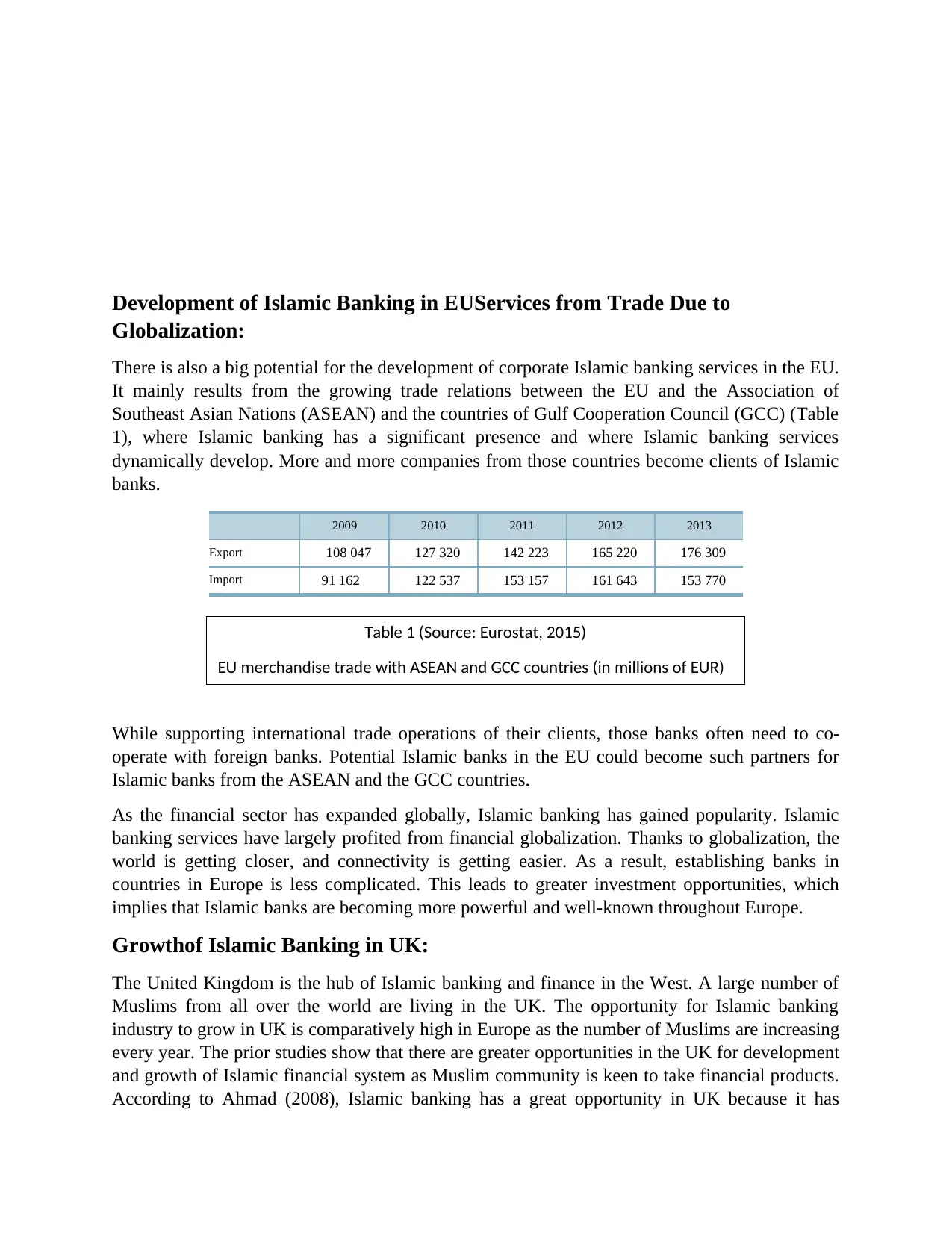
Development of Islamic Banking in EUServices from Trade Due to
Globalization:
There is also a big potential for the development of corporate Islamic banking services in the EU.
It mainly results from the growing trade relations between the EU and the Association of
Southeast Asian Nations (ASEAN) and the countries of Gulf Cooperation Council (GCC) (Table
1), where Islamic banking has a significant presence and where Islamic banking services
dynamically develop. More and more companies from those countries become clients of Islamic
banks.
While supporting international trade operations of their clients, those banks often need to co-
operate with foreign banks. Potential Islamic banks in the EU could become such partners for
Islamic banks from the ASEAN and the GCC countries.
As the financial sector has expanded globally, Islamic banking has gained popularity. Islamic
banking services have largely profited from financial globalization. Thanks to globalization, the
world is getting closer, and connectivity is getting easier. As a result, establishing banks in
countries in Europe is less complicated. This leads to greater investment opportunities, which
implies that Islamic banks are becoming more powerful and well-known throughout Europe.
Growthof Islamic Banking in UK:
The United Kingdom is the hub of Islamic banking and finance in the West. A large number of
Muslims from all over the world are living in the UK. The opportunity for Islamic banking
industry to grow in UK is comparatively high in Europe as the number of Muslims are increasing
every year. The prior studies show that there are greater opportunities in the UK for development
and growth of Islamic financial system as Muslim community is keen to take financial products.
According to Ahmad (2008), Islamic banking has a great opportunity in UK because it has
Table 1 (Source: Eurostat, 2015)
EU merchandise trade with ASEAN and GCC countries (in millions of EUR)
2009 2010 2011 2012 2013
Export 108 047 127 320 142 223 165 220 176 309
Import 91 162 122 537 153 157 161 643 153 770
Globalization:
There is also a big potential for the development of corporate Islamic banking services in the EU.
It mainly results from the growing trade relations between the EU and the Association of
Southeast Asian Nations (ASEAN) and the countries of Gulf Cooperation Council (GCC) (Table
1), where Islamic banking has a significant presence and where Islamic banking services
dynamically develop. More and more companies from those countries become clients of Islamic
banks.
While supporting international trade operations of their clients, those banks often need to co-
operate with foreign banks. Potential Islamic banks in the EU could become such partners for
Islamic banks from the ASEAN and the GCC countries.
As the financial sector has expanded globally, Islamic banking has gained popularity. Islamic
banking services have largely profited from financial globalization. Thanks to globalization, the
world is getting closer, and connectivity is getting easier. As a result, establishing banks in
countries in Europe is less complicated. This leads to greater investment opportunities, which
implies that Islamic banks are becoming more powerful and well-known throughout Europe.
Growthof Islamic Banking in UK:
The United Kingdom is the hub of Islamic banking and finance in the West. A large number of
Muslims from all over the world are living in the UK. The opportunity for Islamic banking
industry to grow in UK is comparatively high in Europe as the number of Muslims are increasing
every year. The prior studies show that there are greater opportunities in the UK for development
and growth of Islamic financial system as Muslim community is keen to take financial products.
According to Ahmad (2008), Islamic banking has a great opportunity in UK because it has
Table 1 (Source: Eurostat, 2015)
EU merchandise trade with ASEAN and GCC countries (in millions of EUR)
2009 2010 2011 2012 2013
Export 108 047 127 320 142 223 165 220 176 309
Import 91 162 122 537 153 157 161 643 153 770
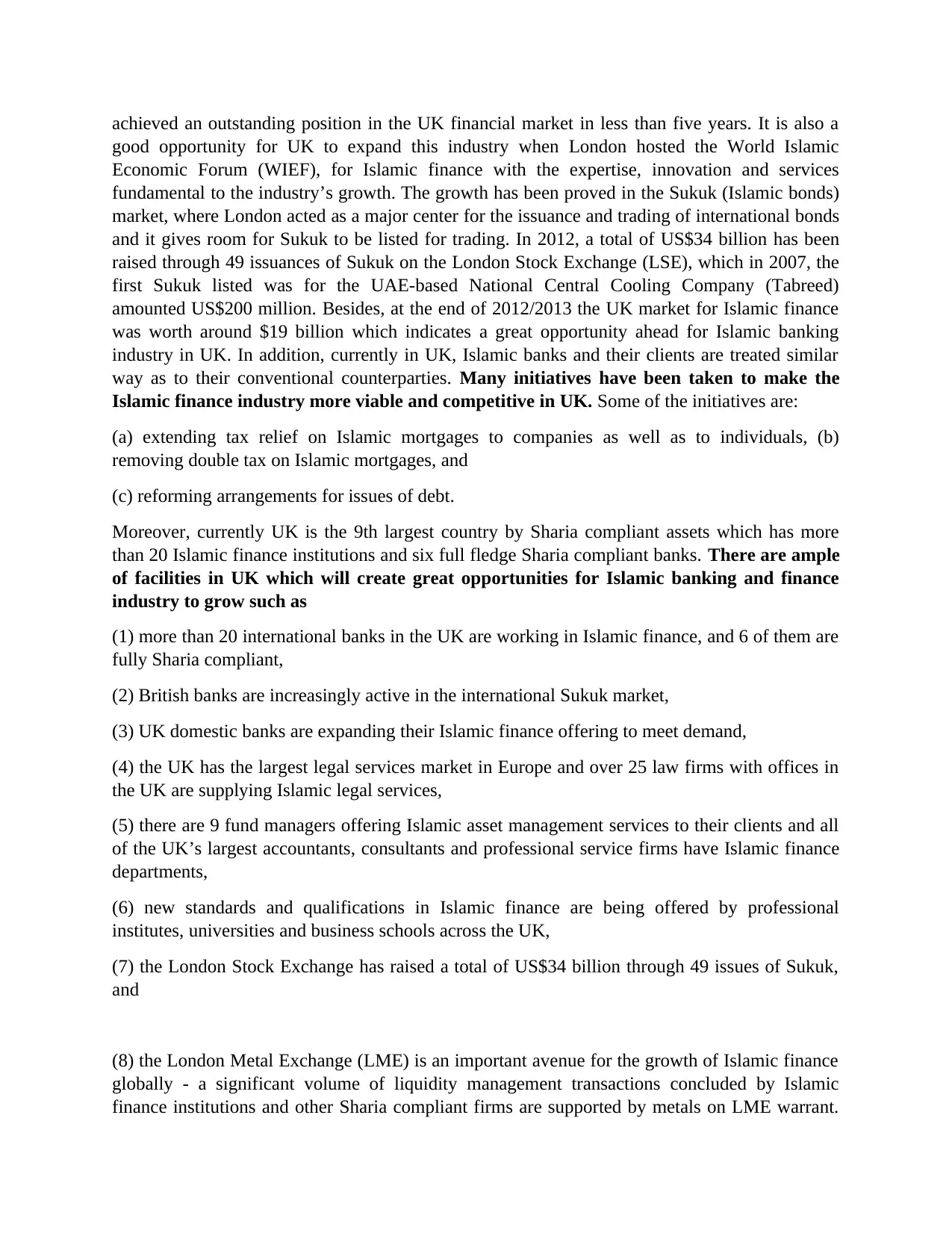
achieved an outstanding position in the UK financial market in less than five years. It is also a
good opportunity for UK to expand this industry when London hosted the World Islamic
Economic Forum (WIEF), for Islamic finance with the expertise, innovation and services
fundamental to the industry’s growth. The growth has been proved in the Sukuk (Islamic bonds)
market, where London acted as a major center for the issuance and trading of international bonds
and it gives room for Sukuk to be listed for trading. In 2012, a total of US$34 billion has been
raised through 49 issuances of Sukuk on the London Stock Exchange (LSE), which in 2007, the
first Sukuk listed was for the UAE-based National Central Cooling Company (Tabreed)
amounted US$200 million. Besides, at the end of 2012/2013 the UK market for Islamic finance
was worth around $19 billion which indicates a great opportunity ahead for Islamic banking
industry in UK. In addition, currently in UK, Islamic banks and their clients are treated similar
way as to their conventional counterparties. Many initiatives have been taken to make the
Islamic finance industry more viable and competitive in UK. Some of the initiatives are:
(a) extending tax relief on Islamic mortgages to companies as well as to individuals, (b)
removing double tax on Islamic mortgages, and
(c) reforming arrangements for issues of debt.
Moreover, currently UK is the 9th largest country by Sharia compliant assets which has more
than 20 Islamic finance institutions and six full fledge Sharia compliant banks. There are ample
of facilities in UK which will create great opportunities for Islamic banking and finance
industry to grow such as
(1) more than 20 international banks in the UK are working in Islamic finance, and 6 of them are
fully Sharia compliant,
(2) British banks are increasingly active in the international Sukuk market,
(3) UK domestic banks are expanding their Islamic finance offering to meet demand,
(4) the UK has the largest legal services market in Europe and over 25 law firms with offices in
the UK are supplying Islamic legal services,
(5) there are 9 fund managers offering Islamic asset management services to their clients and all
of the UK’s largest accountants, consultants and professional service firms have Islamic finance
departments,
(6) new standards and qualifications in Islamic finance are being offered by professional
institutes, universities and business schools across the UK,
(7) the London Stock Exchange has raised a total of US$34 billion through 49 issues of Sukuk,
and
(8) the London Metal Exchange (LME) is an important avenue for the growth of Islamic finance
globally - a significant volume of liquidity management transactions concluded by Islamic
finance institutions and other Sharia compliant firms are supported by metals on LME warrant.
good opportunity for UK to expand this industry when London hosted the World Islamic
Economic Forum (WIEF), for Islamic finance with the expertise, innovation and services
fundamental to the industry’s growth. The growth has been proved in the Sukuk (Islamic bonds)
market, where London acted as a major center for the issuance and trading of international bonds
and it gives room for Sukuk to be listed for trading. In 2012, a total of US$34 billion has been
raised through 49 issuances of Sukuk on the London Stock Exchange (LSE), which in 2007, the
first Sukuk listed was for the UAE-based National Central Cooling Company (Tabreed)
amounted US$200 million. Besides, at the end of 2012/2013 the UK market for Islamic finance
was worth around $19 billion which indicates a great opportunity ahead for Islamic banking
industry in UK. In addition, currently in UK, Islamic banks and their clients are treated similar
way as to their conventional counterparties. Many initiatives have been taken to make the
Islamic finance industry more viable and competitive in UK. Some of the initiatives are:
(a) extending tax relief on Islamic mortgages to companies as well as to individuals, (b)
removing double tax on Islamic mortgages, and
(c) reforming arrangements for issues of debt.
Moreover, currently UK is the 9th largest country by Sharia compliant assets which has more
than 20 Islamic finance institutions and six full fledge Sharia compliant banks. There are ample
of facilities in UK which will create great opportunities for Islamic banking and finance
industry to grow such as
(1) more than 20 international banks in the UK are working in Islamic finance, and 6 of them are
fully Sharia compliant,
(2) British banks are increasingly active in the international Sukuk market,
(3) UK domestic banks are expanding their Islamic finance offering to meet demand,
(4) the UK has the largest legal services market in Europe and over 25 law firms with offices in
the UK are supplying Islamic legal services,
(5) there are 9 fund managers offering Islamic asset management services to their clients and all
of the UK’s largest accountants, consultants and professional service firms have Islamic finance
departments,
(6) new standards and qualifications in Islamic finance are being offered by professional
institutes, universities and business schools across the UK,
(7) the London Stock Exchange has raised a total of US$34 billion through 49 issues of Sukuk,
and
(8) the London Metal Exchange (LME) is an important avenue for the growth of Islamic finance
globally - a significant volume of liquidity management transactions concluded by Islamic
finance institutions and other Sharia compliant firms are supported by metals on LME warrant.
⊘ This is a preview!⊘
Do you want full access?
Subscribe today to unlock all pages.

Trusted by 1+ million students worldwide
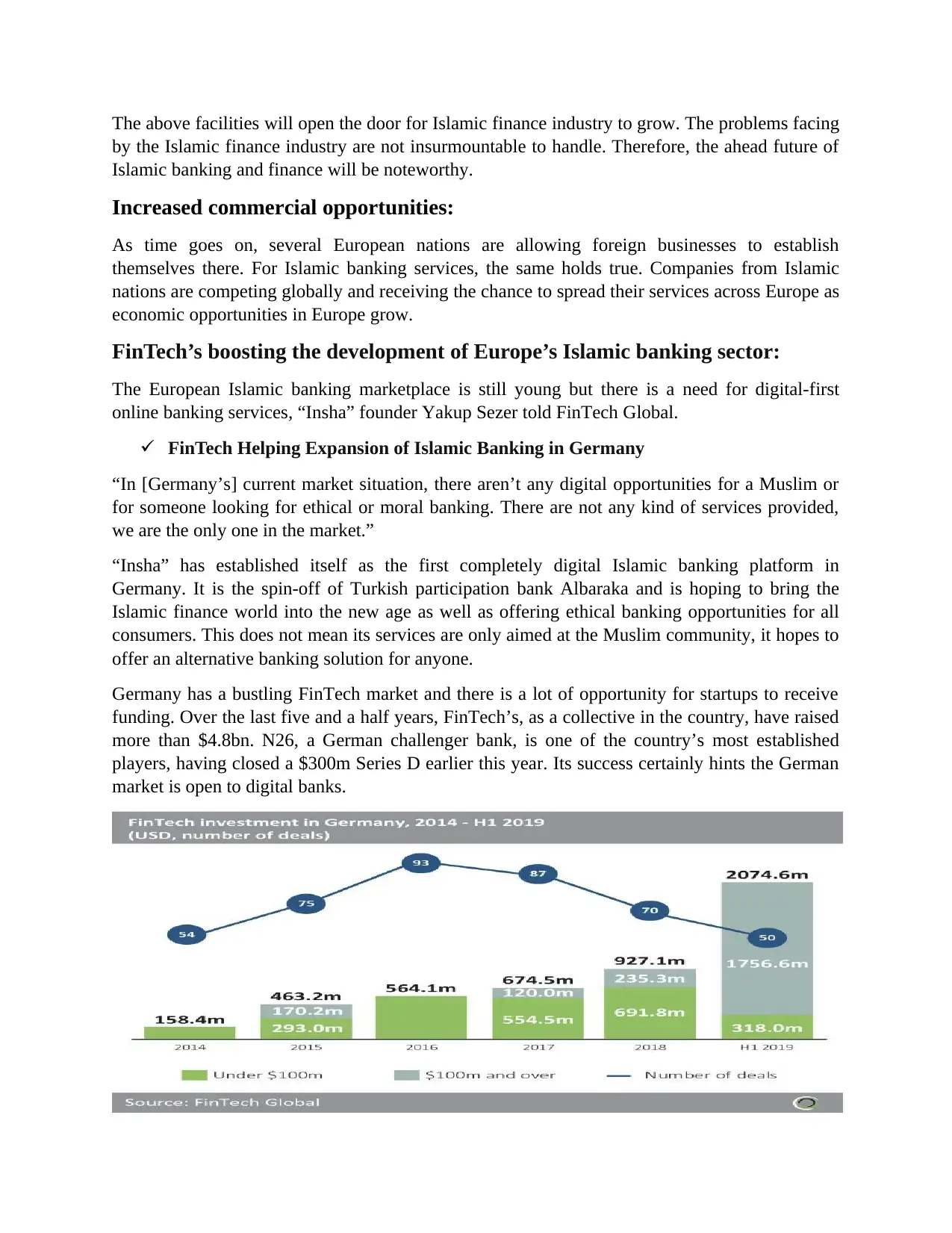
The above facilities will open the door for Islamic finance industry to grow. The problems facing
by the Islamic finance industry are not insurmountable to handle. Therefore, the ahead future of
Islamic banking and finance will be noteworthy.
Increased commercial opportunities:
As time goes on, several European nations are allowing foreign businesses to establish
themselves there. For Islamic banking services, the same holds true. Companies from Islamic
nations are competing globally and receiving the chance to spread their services across Europe as
economic opportunities in Europe grow.
FinTech’s boosting the development of Europe’s Islamic banking sector:
The European Islamic banking marketplace is still young but there is a need for digital-first
online banking services, “Insha” founder Yakup Sezer told FinTech Global.
FinTech Helping Expansion of Islamic Banking in Germany
“In [Germany’s] current market situation, there aren’t any digital opportunities for a Muslim or
for someone looking for ethical or moral banking. There are not any kind of services provided,
we are the only one in the market.”
“Insha” has established itself as the first completely digital Islamic banking platform in
Germany. It is the spin-off of Turkish participation bank Albaraka and is hoping to bring the
Islamic finance world into the new age as well as offering ethical banking opportunities for all
consumers. This does not mean its services are only aimed at the Muslim community, it hopes to
offer an alternative banking solution for anyone.
Germany has a bustling FinTech market and there is a lot of opportunity for startups to receive
funding. Over the last five and a half years, FinTech’s, as a collective in the country, have raised
more than $4.8bn. N26, a German challenger bank, is one of the country’s most established
players, having closed a $300m Series D earlier this year. Its success certainly hints the German
market is open to digital banks.
by the Islamic finance industry are not insurmountable to handle. Therefore, the ahead future of
Islamic banking and finance will be noteworthy.
Increased commercial opportunities:
As time goes on, several European nations are allowing foreign businesses to establish
themselves there. For Islamic banking services, the same holds true. Companies from Islamic
nations are competing globally and receiving the chance to spread their services across Europe as
economic opportunities in Europe grow.
FinTech’s boosting the development of Europe’s Islamic banking sector:
The European Islamic banking marketplace is still young but there is a need for digital-first
online banking services, “Insha” founder Yakup Sezer told FinTech Global.
FinTech Helping Expansion of Islamic Banking in Germany
“In [Germany’s] current market situation, there aren’t any digital opportunities for a Muslim or
for someone looking for ethical or moral banking. There are not any kind of services provided,
we are the only one in the market.”
“Insha” has established itself as the first completely digital Islamic banking platform in
Germany. It is the spin-off of Turkish participation bank Albaraka and is hoping to bring the
Islamic finance world into the new age as well as offering ethical banking opportunities for all
consumers. This does not mean its services are only aimed at the Muslim community, it hopes to
offer an alternative banking solution for anyone.
Germany has a bustling FinTech market and there is a lot of opportunity for startups to receive
funding. Over the last five and a half years, FinTech’s, as a collective in the country, have raised
more than $4.8bn. N26, a German challenger bank, is one of the country’s most established
players, having closed a $300m Series D earlier this year. Its success certainly hints the German
market is open to digital banks.
Paraphrase This Document
Need a fresh take? Get an instant paraphrase of this document with our AI Paraphraser
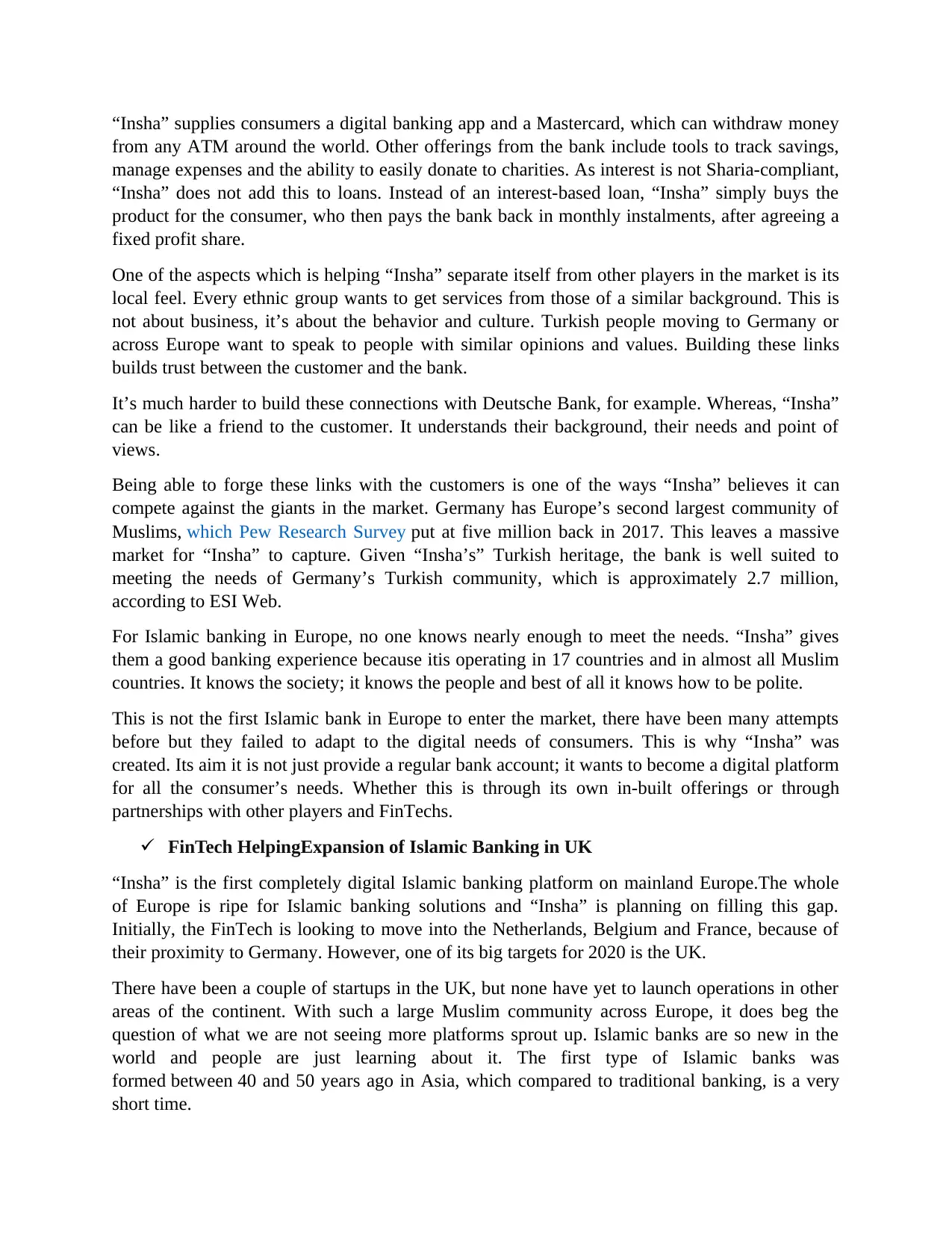
“Insha” supplies consumers a digital banking app and a Mastercard, which can withdraw money
from any ATM around the world. Other offerings from the bank include tools to track savings,
manage expenses and the ability to easily donate to charities. As interest is not Sharia-compliant,
“Insha” does not add this to loans. Instead of an interest-based loan, “Insha” simply buys the
product for the consumer, who then pays the bank back in monthly instalments, after agreeing a
fixed profit share.
One of the aspects which is helping “Insha” separate itself from other players in the market is its
local feel. Every ethnic group wants to get services from those of a similar background. This is
not about business, it’s about the behavior and culture. Turkish people moving to Germany or
across Europe want to speak to people with similar opinions and values. Building these links
builds trust between the customer and the bank.
It’s much harder to build these connections with Deutsche Bank, for example. Whereas, “Insha”
can be like a friend to the customer. It understands their background, their needs and point of
views.
Being able to forge these links with the customers is one of the ways “Insha” believes it can
compete against the giants in the market. Germany has Europe’s second largest community of
Muslims, which Pew Research Survey put at five million back in 2017. This leaves a massive
market for “Insha” to capture. Given “Insha’s” Turkish heritage, the bank is well suited to
meeting the needs of Germany’s Turkish community, which is approximately 2.7 million,
according to ESI Web.
For Islamic banking in Europe, no one knows nearly enough to meet the needs. “Insha” gives
them a good banking experience because itis operating in 17 countries and in almost all Muslim
countries. It knows the society; it knows the people and best of all it knows how to be polite.
This is not the first Islamic bank in Europe to enter the market, there have been many attempts
before but they failed to adapt to the digital needs of consumers. This is why “Insha” was
created. Its aim it is not just provide a regular bank account; it wants to become a digital platform
for all the consumer’s needs. Whether this is through its own in-built offerings or through
partnerships with other players and FinTechs.
FinTech HelpingExpansion of Islamic Banking in UK
“Insha” is the first completely digital Islamic banking platform on mainland Europe.The whole
of Europe is ripe for Islamic banking solutions and “Insha” is planning on filling this gap.
Initially, the FinTech is looking to move into the Netherlands, Belgium and France, because of
their proximity to Germany. However, one of its big targets for 2020 is the UK.
There have been a couple of startups in the UK, but none have yet to launch operations in other
areas of the continent. With such a large Muslim community across Europe, it does beg the
question of what we are not seeing more platforms sprout up. Islamic banks are so new in the
world and people are just learning about it. The first type of Islamic banks was
formed between 40 and 50 years ago in Asia, which compared to traditional banking, is a very
short time.
from any ATM around the world. Other offerings from the bank include tools to track savings,
manage expenses and the ability to easily donate to charities. As interest is not Sharia-compliant,
“Insha” does not add this to loans. Instead of an interest-based loan, “Insha” simply buys the
product for the consumer, who then pays the bank back in monthly instalments, after agreeing a
fixed profit share.
One of the aspects which is helping “Insha” separate itself from other players in the market is its
local feel. Every ethnic group wants to get services from those of a similar background. This is
not about business, it’s about the behavior and culture. Turkish people moving to Germany or
across Europe want to speak to people with similar opinions and values. Building these links
builds trust between the customer and the bank.
It’s much harder to build these connections with Deutsche Bank, for example. Whereas, “Insha”
can be like a friend to the customer. It understands their background, their needs and point of
views.
Being able to forge these links with the customers is one of the ways “Insha” believes it can
compete against the giants in the market. Germany has Europe’s second largest community of
Muslims, which Pew Research Survey put at five million back in 2017. This leaves a massive
market for “Insha” to capture. Given “Insha’s” Turkish heritage, the bank is well suited to
meeting the needs of Germany’s Turkish community, which is approximately 2.7 million,
according to ESI Web.
For Islamic banking in Europe, no one knows nearly enough to meet the needs. “Insha” gives
them a good banking experience because itis operating in 17 countries and in almost all Muslim
countries. It knows the society; it knows the people and best of all it knows how to be polite.
This is not the first Islamic bank in Europe to enter the market, there have been many attempts
before but they failed to adapt to the digital needs of consumers. This is why “Insha” was
created. Its aim it is not just provide a regular bank account; it wants to become a digital platform
for all the consumer’s needs. Whether this is through its own in-built offerings or through
partnerships with other players and FinTechs.
FinTech HelpingExpansion of Islamic Banking in UK
“Insha” is the first completely digital Islamic banking platform on mainland Europe.The whole
of Europe is ripe for Islamic banking solutions and “Insha” is planning on filling this gap.
Initially, the FinTech is looking to move into the Netherlands, Belgium and France, because of
their proximity to Germany. However, one of its big targets for 2020 is the UK.
There have been a couple of startups in the UK, but none have yet to launch operations in other
areas of the continent. With such a large Muslim community across Europe, it does beg the
question of what we are not seeing more platforms sprout up. Islamic banks are so new in the
world and people are just learning about it. The first type of Islamic banks was
formed between 40 and 50 years ago in Asia, which compared to traditional banking, is a very
short time.
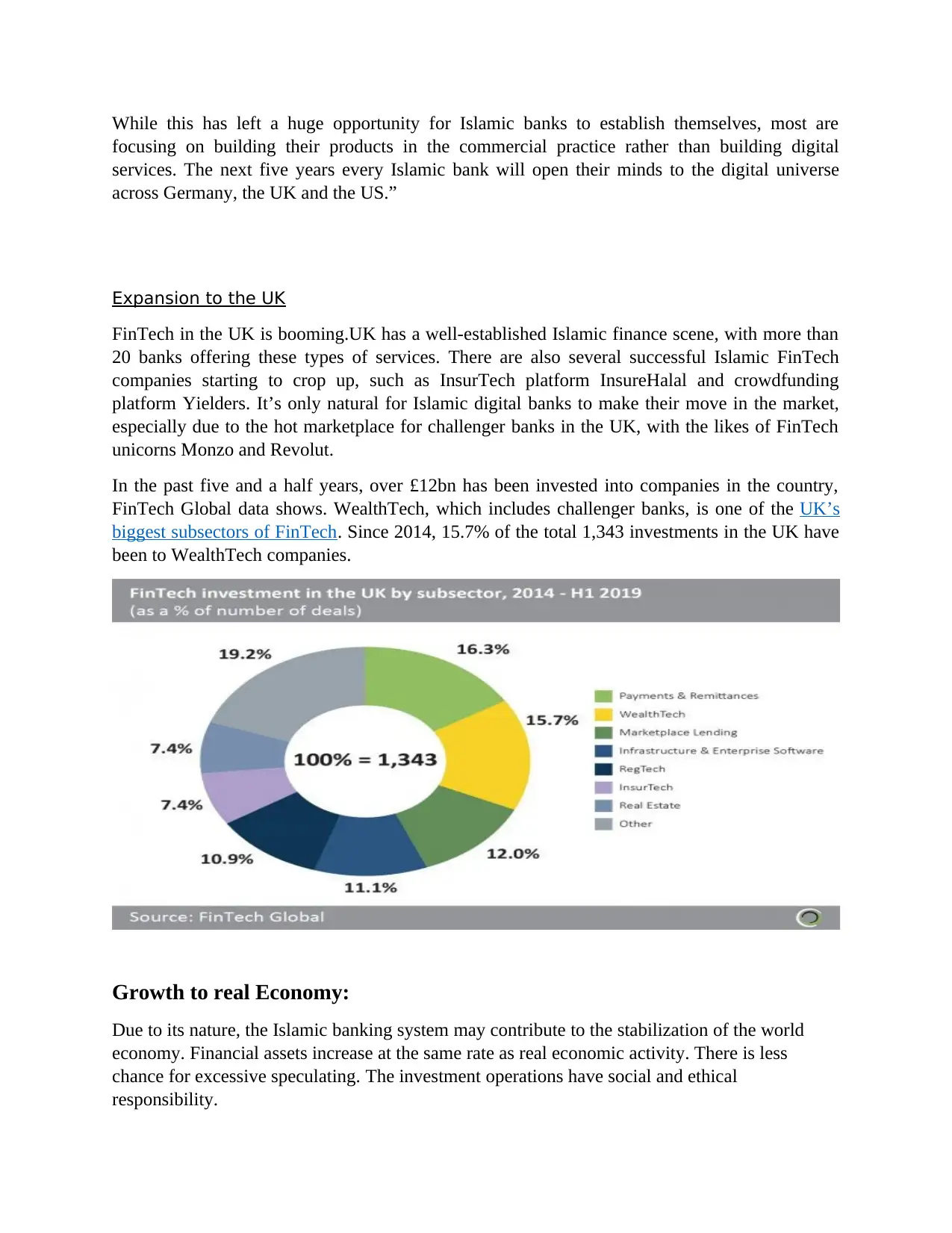
While this has left a huge opportunity for Islamic banks to establish themselves, most are
focusing on building their products in the commercial practice rather than building digital
services. The next five years every Islamic bank will open their minds to the digital universe
across Germany, the UK and the US.”
Expansion to the UK
FinTech in the UK is booming.UK has a well-established Islamic finance scene, with more than
20 banks offering these types of services. There are also several successful Islamic FinTech
companies starting to crop up, such as InsurTech platform InsureHalal and crowdfunding
platform Yielders. It’s only natural for Islamic digital banks to make their move in the market,
especially due to the hot marketplace for challenger banks in the UK, with the likes of FinTech
unicorns Monzo and Revolut.
In the past five and a half years, over £12bn has been invested into companies in the country,
FinTech Global data shows. WealthTech, which includes challenger banks, is one of the UK’s
biggest subsectors of FinTech. Since 2014, 15.7% of the total 1,343 investments in the UK have
been to WealthTech companies.
Growth to real Economy:
Due to its nature, the Islamic banking system may contribute to the stabilization of the world
economy. Financial assets increase at the same rate as real economic activity. There is less
chance for excessive speculating. The investment operations have social and ethical
responsibility.
focusing on building their products in the commercial practice rather than building digital
services. The next five years every Islamic bank will open their minds to the digital universe
across Germany, the UK and the US.”
Expansion to the UK
FinTech in the UK is booming.UK has a well-established Islamic finance scene, with more than
20 banks offering these types of services. There are also several successful Islamic FinTech
companies starting to crop up, such as InsurTech platform InsureHalal and crowdfunding
platform Yielders. It’s only natural for Islamic digital banks to make their move in the market,
especially due to the hot marketplace for challenger banks in the UK, with the likes of FinTech
unicorns Monzo and Revolut.
In the past five and a half years, over £12bn has been invested into companies in the country,
FinTech Global data shows. WealthTech, which includes challenger banks, is one of the UK’s
biggest subsectors of FinTech. Since 2014, 15.7% of the total 1,343 investments in the UK have
been to WealthTech companies.
Growth to real Economy:
Due to its nature, the Islamic banking system may contribute to the stabilization of the world
economy. Financial assets increase at the same rate as real economic activity. There is less
chance for excessive speculating. The investment operations have social and ethical
responsibility.
⊘ This is a preview!⊘
Do you want full access?
Subscribe today to unlock all pages.

Trusted by 1+ million students worldwide

CONCLUSIONS:
Paraphrase This Document
Need a fresh take? Get an instant paraphrase of this document with our AI Paraphraser

The entry of Islamic banking into the European Union market presents a chance for the resident
nations to draw in more Middle Eastern oil money, as well as a significant expansion of the
Islamic banks' clientele. However, there is still a lot of work to be done because of the
difficulties that both parties may encounter, particularly in the areas of supervision and
regulation. Because the idea of Islamic banking is very new and very distinct from traditional
banking, the resident countries of these institutions should change its legal framework and take
into account all the hazards that this new financial sector may provide.
nations to draw in more Middle Eastern oil money, as well as a significant expansion of the
Islamic banks' clientele. However, there is still a lot of work to be done because of the
difficulties that both parties may encounter, particularly in the areas of supervision and
regulation. Because the idea of Islamic banking is very new and very distinct from traditional
banking, the resident countries of these institutions should change its legal framework and take
into account all the hazards that this new financial sector may provide.
1 out of 8
Related Documents
Your All-in-One AI-Powered Toolkit for Academic Success.
+13062052269
info@desklib.com
Available 24*7 on WhatsApp / Email
![[object Object]](/_next/static/media/star-bottom.7253800d.svg)
Unlock your academic potential
Copyright © 2020–2026 A2Z Services. All Rights Reserved. Developed and managed by ZUCOL.




